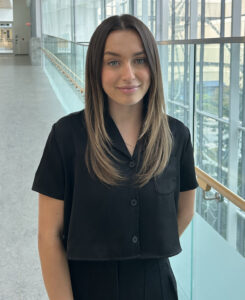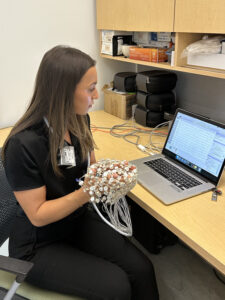Julianne McLeod is a Master of Science in Rehabilitation Science student under the supervision of Dr. Naznin Virji-Babul in the Perception-Action Lab. We caught up with Julianne to learn more about her research interests and her experience as a graduate student.

What is your thesis project on?
I am using electroencephalography (EEG) to investigate brain network connectivity in female varsity athletes following sport-related concussion. I am particularly interested in how brain-hormone relationships impact injury outcomes.
What is your educational background?
I received my Bachelor of Science (Honours) in Health Science with a minor in Neuroscience and Mental Health from Carleton University in Ottawa, Ontario. As an undergraduate student, I took every opportunity to explore the world of concussion. It was this genuine curiosity that ultimately led me to study it at a graduate level.
Why are you interested in Neuroscience?
Studying neuroscience is exciting. Understanding how the brain develops, how we process information, how we perceive the world around us, how the brain interacts with the rest of the body – it’s all fascinating. I don’t think I will ever get tired of asking questions about the brain.
What is a typical day like for you as a graduate student?
I am currently in the data collection phase of my thesis, meaning that most of my days consist of athletes coming into the lab for testing. Along with collecting the data comes a lengthy data cleaning process, so I also spend lots of time behind the computer.

What are your future career goals?
In short – I don’t know exactly what my future career will be just yet. I hope to stay in the field of neuroscience and brain injury. I am also extremely passionate about improving our understanding of women’s health and working toward equal representation in scientific research. I hope to find a role where I can do both.
What advice do you have for students interested in graduate school?
There is so much research at UBC – find something that truly excites you.


